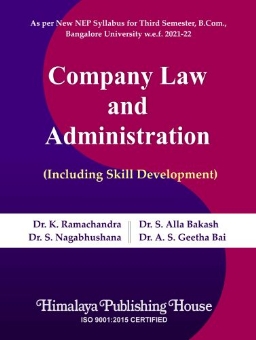It is a great opportunity, privilege and pleasure to present yet another book to our valued readers. The specialty is that Government of Karnataka as leading state in the promotion of higher education has introduced National Education Policy – 2020. The first and second semester text books authored by us where well received by the readers from all parts of Karnataka in particular and India in general. The e-book on the different NEP based text book received wide acclaimed and approval from all quarters. We thank immensely our reader patrons.
We are very happy to place one more text book under New Education Policy entitled ‘Company Law and Administration’. As you are well aware the Companies Act 2013 revitalized, redefined and reinvented the rules of the game for corporate and their administrators for effective governance, administration and management. The Company Act introduced, key managerial personal, corporate social responsibility structure and dispensation, and wide array of new sections and rules.
The text book is presented methodically as per the syllabus and also taking into account the skill development components. The first chapter delves upon the highlights of the Companies Act 2013, Kinds of Companies and One person Company Global Company and Corporate Listed Companies. Second Chapter of the text books deliberates on the various dimensions of formation of companies apart from expounding the important documents and e-filing aspects for starting and compliances of rules in respect of the different kinds of companies.
Chapter three deal with Capital Structure and Accounts of Companies, Share Capital and Debentures, statutory books and financial statements. The Chapter four deals with Administrative and Managerial role of a Company, key managerial personal, C-suite Executives, CEO, CFO,COO, CTO, CKO, CRO and CIO; company secretary, his / her qualification, appointment, position, rights, duties, liabilities and so on. Chapter five Corporate Meetings and Winding Up of a Company deals with Corporate Meeting, Requisite of Valid Meeting Board of Directors and Modes of Winding up, Official Liquidator and the like. Further, insolvency code intricacies or meticulously expounded for the clear and lucid understanding of the subject corporate administration.
Contents –
1. Introduction to Company
2. Formation of a New Company
3. Capital Structure and Accounts of Companies
4. Administrative and Managerial Role of a Company
5. Corporate Meetings and Winding Up of a Company
Skill Development
Model Question Papers







